

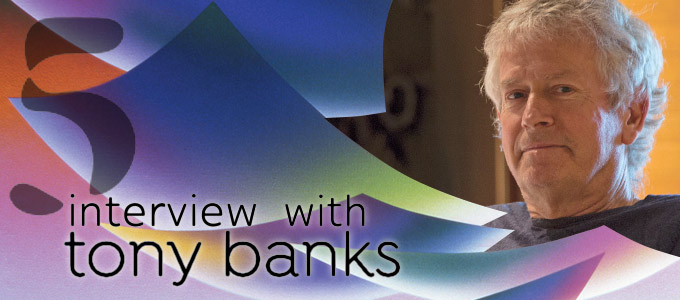
Tony Banks has been quite active since the last Genesis tour. He released SIX, the follow-up to his classical debut SEVEN and he also released a boxset which compiles the best of his solo work: A Chord Too Far. Tony has been working with tenor John Potter and he eventually received the "Prog God" award in 2015, following Peter Gabriel. Now Tony's new album FIVE is scheduled for a 23rd February release. So, we have plenty of stuff to discuss. Christian Gerhardts talked to Tony Banks on the phone on 23rd January.
GNC: Hi Tony, I just got the album and had the chance to listen to FIVE twice today but before we dive into the album: the original release date was 2nd February. Was that intentional? 50 years ago on that day, the first ever Genesis single The Silent Sun was released.
Tony (laughs): No I'm afraid it wasn't, that was just a coincidence. We then had to put it back a bit, because the record company BMG felt they wanted to do a bit more work promoting the album before releasing it. That's why it's coming out later. But that makes me think - yes, 50 years … a long time ago!
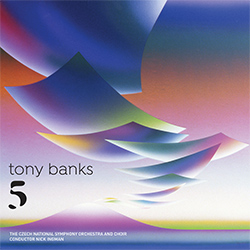 GNC: So, BMG is now your new record company for the classical stuff. Why is that? Do you have a new promotion strategy?
GNC: So, BMG is now your new record company for the classical stuff. Why is that? Do you have a new promotion strategy?
Tony: Well, the last two orchestra pieces were released on NAXOS - and they do mostly old rereleases and not new material. They did a nice job on my pieces, but BMG are more of a „go ahead“ company and they were quite keen to do this record so we thought let's got with it because they can do more promotion perhaps than NAXOS did.
GNC: Is the deal only for this album or is it a longer contract?
Tony: It's just for this album, but it's always like: when things go well, you might do more, so we'll see. That's the plan.
GNC: We did an interview in 2015 about the A Chord Too Far boxset
Tony: Yes, right, I remember …
GNC: and I asked you whether or not your next album is going to be called FIVE and you said „I hope not“. So …?
Tony: yeah, well that's what I hoped (laughs). I was thinking about avoiding it but it's just one of those things, - as it ended up being five pieces, because my pieces are getting slightly longer so that you have the same amount of time, but fewer pieces. I though I can't fight it, really, I have to call it FIVE rather than kind of pretend it's something else by giving it a second title. So we sticked to FIVE, I'm not hiding it. I like numbers actually. Also, for me, instrumental music isn't necessarily about any particular thing. A number is an abstract, it doesn't carry anything with it. So you just listen to the music not trying to imagine anything else.
GNC: We now have this kind of feeling of a countdown. Do we have to be scared you will stop making music one day? Or do you think there's plenty of time for four further albums?
Tony: I'm looking forward to ZERO (laughs). That is just a blank album, which would be great. No, I don't know. who knows? FOUR would be a classical symphony. Maybe that would be the one to stop. Anyway, it just came out that way.
GNC: Speaking about the titles of the pieces - how do they come about? One of the tracks is called Prelude To A Million Years and one might expect the following track is just A Million Years...
Tony: This title - I used it from an American graphic artist Lynd Ward who did a series of books in the 30ies to the 60ies, which were Stories Without Words, and I liked his books. And one of the titles was Prelude To A Million Years. I quite liked it, although it might be a bit pretentious. But it was quite a nice way to start. And I always thought that for the third piece on the record, it's kind of a Prelude in a way. It's not a title that comes up with anything specific. But the idea of time and passing of time is quite nice. But I was very careful with the titles, trying that they don't have too much baggage with them. And also it's a little pattern, it's a prelude, then there's a morning feel, middle of the day, evening and night. So there's this kind of concept hidden in the titles.
"FIVE is a bit like early Genesis stuff, with many changes"
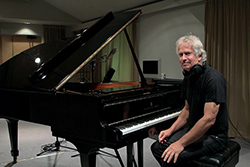 GNC: The pieces reminded me a bit of film scores. Was this your intention to have them sound that way?
GNC: The pieces reminded me a bit of film scores. Was this your intention to have them sound that way?
Tony: No, I just write what I write. Also, film scores are also incredibly simple pieces of music. They have to be, they have these themes which you repeat quite a lot and everything else is built around it. FIVE may be thematically and a bit filmic, but the idea is more: they go from place to place. There are a lot of different melodies incorporated in these pieces. They are supposed to work in a kind of mood-way, taking you from one mood to another. It's a bit like early Genesis stuff. We would often start quiet and go loud and quite again with a song like Supper's Ready or The Musical Box. You go through various changes, which is what interests me and that's what I have been doing on that record.
GNC: The five tracks have all these changes between atmospheric and dynamic parts. Did you consider to do something like the Bolero, building it all up to a grand finale?
Tony: No, I try to have these changes, but in the end I also do have climaxes, especially towards the end of the tracks. Most of the endings are quite dramatic. It's like Renaissance, where it starts really atmospheric, but then concludes in this dramatic bit. It has a very optomistic feel, it's almost a song. But I don't think about that too much. I do what I do and hope to carry other people with me.
GNC: Speaking of Renaissance - the promo text says it was based on something you did during a Genesis session, Can you tell me which session that is from and the whole story behind that?
Tony: I don't know where this Genesis thing came from, it doesn't have to do anything with Genesis. I had this old piece, yes. I was listening to some older recordings to find some intersting ideas, and this one was written as a possible film thing. But it was only a minute long and this became the introduction of Renaissance. And then I built the whole song or track from there. It was probably written thirty years ago, but I used only 20 or 30 seconds and then wrote the whole thing from there. It's also the most recent things I have written.
"FIVE is exactly what I wanted to put down on record!"
GNC: You also recorded the album section by section this time. Do you find it difficult in orchestral music to focus on the whole thing when you work that way?
Tony: No, it's much easier to keep track of everything. I did pretty comprehensive demos of all these pieces, which sound quite similar to the results. I actually used my demos as the template for each piece. The piano you hear is actually the one I put down on the demos. We used that as a basis and put all the other stuff on top of that. We used my demo parts for the other parts to play against. So when we did the trumpet part on Reveille, he would play against the other parts, doing his part. And we could easily check how it worked with the rest of the track. Then we could adjust it until it was right. It's a much easier way to work. You're also dealing with music that has never been heard before. And the orchestra has never played it before. With the last two records I came in the studio and the orchestra didn't know the music. You spend the first hour trying to correct all the mistakes, then the next hour to get them roughly together. And then after that you hope to get an performance out of them. That can be very difficult and sometimes you don't end up where you want to. On this one I got the result I intended to get. I am happy with it, no matter if people like it or don't like it, it's exactly what I wanted to put down on record.
GNC: So when you started recording the album you didn't decide to play piano on this one, you just took your piano demos and used them in the end?
Tony: It was kind of there when I did the demos, but I wasn't sure if the piano would be there in the end or not, in fact we have replaced some of the parts with other instruments and some other parts we lost because they weren't really necessary. There are no solo piano parts on FIVE anyway, it's just how I wrote them and sometimes also with the idea to replace the piano in the end. In contrast: SIX was a record where I didn't want to play on it at all. I am more of a writer, not a player anyway. But FIVE was different. There were times when we thought we'd lose the piano, but then often it sounded really good so it stayed. It's nice to have it on there. It forms some kind of backbone to many of the pieces, keeping the whole thing together.
GNC: How did you meet Nick Ingman and what was his specific role in this project?
Tony: I've heard about him before from various people and he was someone I wanted to meet for this project because he is very used to work in this particular way - in doing things separately, he is very experienced. So I played him the stuff and he was very enthusiastic, and we worked out a way of working together. Basically his first job was to transcribe my parts to be played by an orchestra. He then worked his own bits and pieces in there a bit, particularly on the percussion end because I haven't really done much of that on my demos. He came up with other ideas as well, and some we used, some we didn't use and some modifications. So that was his role and he was sympathetic to what I was trying to do. He was great! He did a fantastic job, very hard working. He wasn't only the orchestrator, but also the conductor. That also helps a lot. I did that on SIX as well, having someone who knows all the music and doing this work. Ingman is very precise. We've put clicks everywhere during recording, especially because the tempo changes a lot. And he was very good conducting all that and getting the information across to the orchestra.
GNC: How do you decide which instrument plays a specific part? Do you have something in mind when writing or is it more try and error when recording?
Tony: It's a bit try and error. Sometimes I also have something in mind that works. Tracks like Reveille or Ebb And Flow, where you have a saxophone or trumpet lead. I imporovised with keyboards nevertheless, but I used a trumpet sound for the whole solo. And on the other one I did the sax lead with an oboe, a bit more extravagant sound. It works like this.
"I'd rather see someone else perform FIVE live"
GNC: Do you consider performing FIVE live? Could be a nice concept, playing five shows in Europe ...
Tony: Oh well, I mean … yes I have thought about it. But I would be more happy if someone else did it. I mean this music is now out there. If anybody else wanted to play it, they are welcome to. I could still be there and hold the stuff together, but that could also be a bit self indulgent in a way. I have made the record and for the live performance I would rather see someone else taking over, you know. It may happen, I have some people around me who are trying to pursuade me to do it so it's something that could happen.
GNC: That would be nice and you could always add classic adaptions from Genesis or your solo stuff.
Tony: That's the thing, I could do a show of that kind. But maybe that's a different thing. I'd rather be not performing at all (laughs). I mean I worte it and I played on it but it's not crucial, so someone else could do it. But I'd love to hear it! It may happen.
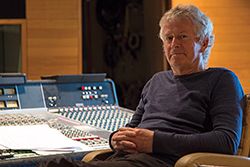 GNC: You used a choir this time on Renaissance …
GNC: You used a choir this time on Renaissance …
Tony: … yes and also on Reveille, where it's quiter and in Autumn Sonata, where it's quite extensive, but it's more used as an instrument rather than a featured part. It was Nick Ingman's idea to use a choir. And once we've decided to have the choir on Reveille and Autumn Sonata I wrote Renaissance, which I did while we were already working on FIVE and made the choir more of a feature on that one. That was quite a fun thing to do. There's something about human voice that is really special and it takes this piece somewhere else.
"Bankstatement and Soundtracks could still come out in 5.1"
GNC: Let's talk about you solo stuff in general. You started to rerelease your albums remastered and in 5.1. What happend to these releases?
Tony: I don't really know. Perhaps Esoteric got cold feet. I wanted to do the A Chord Too Far boxset. I wanted to have something out there that included the best things I have done. I was of course very happy when they wanted to put out the individual albums as well. I just think it cost them more money than it should have. They may come back to them, I suppose. I'd like to do Bankstatement and Soundtracks. We did those already when we were working on A Chord Too Far. They are quite easy to do and could come out any time, whereas Still and Strictly Inc will be much more of a problem as they are very long and we have to remix them from the beginning. It would have to be very worthwhile to do that. I'm not sure that's going to happen. It's a shame but I think it's not going to happen now.
"I said to Keith Emerson 'You'll always be Prog God to me'"
GNC: You got the „Prog God“ award in 2015…
Tony: Ohhh yes!
GNC: Just after Peter Gabriel. How does that feel? I mean you were focussing on classical stuff at the time, apart from the A Chord Too Far Boxset?
Tony: I was amazed. Since they gave it to Peter in the previous year, I thought they can't give it to the same group two years in a row (laughs). I was very flattered and surprised. That was very nice. I've always made the point that I was always a background man in Genesis. I don't like to be in the spotlight as you know. It's nice to be noticed. There's Rick Wakeman and Ian Anderson, so you have quite a select company there. In a way it's a shame they didn't give it to Keith Emerson, obviously he's no longer with us. He's some sort of founding father of all this stuff, I think. I met him at the time when Rick Wakeman got the Prog God Award. And I said to him „you'll always be Prog God to me“. He was the first person to use an organ in that kind of way. And that led to what everybody came to do later, I think.
GNC: You said you prefer to be in the background. Now, there are plenty of supergroups around with musicians from different bands, doing an album or two. Is that something you could think of doing?
Tony: I never really thought about it actually. If someone came up to me with an idea I might consider to do this. I'm not really good at playing other people's music really. I have my own way of doing things and my way of playing it doesn't necessarily sit in with what other people want, I suppose. I don't have a particular desire to do that. I'm more of a writer than a performer. I would be more interested in writing with other people. Maybe that will happen at some point. But looking at my solo albums when I did stuff with Nik Kershaw, I enjoyed doing that. Shared responsibility etc. and that was a different feel.
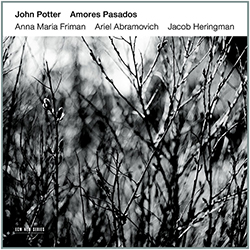 GNC: Anything on the horizon, like new projects?
GNC: Anything on the horizon, like new projects?
Tony: No it's just FIVE at the moment. I've doing that for the last year or two. I also wrote a few songs for this classical tenor, John Potter. Two of these pieces came out on one of his records [Follow Thy Fair Sun and The Cyprus Curtain Of The Night on the album Amores Pasados in 2015]. I did two other pieces as well and one of them I thought was the best of all at the time. And they do that a lot in their show and it goes really well. I hope they will record that sometime in the future.
The other one I did a few months ago, writing to a Shakespear sonnet. I liked doing that with the lyrics being written already. I have never really written songs that way before. It's quite nice to have a lyric to work to and then see how the music fits.
GNC: Speaking about 50 years of Genesis - is there something we can expect in the future like rereleases and boxsets?
Tony: God no! You know this seems to go on forever. People repackage, rerelease etc. The group is not in favor of this. We feel that it looks like we're trying to get more money out of the fans. I don't feel comfortable with it. The record company wants to do it all the time. Management says we have to do it etc. Phil and I always put the damper on it (laughs). We're not interested really, but sometimes you can't stop it. There is stuff like the BBC archive, different live versions etc. There is nothing particular new. There may be rereleases in new formats, who knows, like Blu-ray, but nothing new. I don't think there's anything terrific or exciting to come. I always feel sorry for Nick Davis, because he must have heared a song like Home By The Sea 500 times, deciding which is the best live version etc. It's out there. So for people who want that kind of thing, well … yes there will be more stuff. Speaking about the 50th anniversary - we never made the most out of our anniversaries. It's quite a long time. Perhaps we should just rerelease The Silent Sun, our first single. Perhaps it could be a hit this time around (laughs). Should've been a hit the first time, but it wasn't.
"I'm fed up with these book, I really am"
GNC: Your bandmates, including Richard Macphail, have written books. Isn't it time for you to write your own book?
Tony: I'm fed up with these books, I really am. We did the book Chapter And Verse with Genesis and then Mike did his book which I didn't really like because he was a bit disparaging about me. I haven't read Phil's and I haven't read Richard's. I think both Richard and Phil are a bit nicer with everybody. Perhaps Phil not with himself, but … anyway, what would I do? Writing a book about me? Everybody inflates their own contributions I suppose. And then it becomes some kind of point scoring stuff. I don't need to do that. I think Steve is doing one too, isn't he?
GNC: Well he barely has time for that right now, since he is recording and touring all year…
Tony: Yes okay, I mean people can do that if they like, but there won't come one from me. I will continue to write music. I am a musician and want to be judged by my music and not as a writer of books.
GNC: It's quite common that we close our interviews with a special question, so: in times of Brexit, Trump and Global Warming. What kind of music should people be listening to?
Tony: Just the music you like. It's a strange period right now. and speaking about the music, so much out there is so disposable. It would be nice if people heard music with more than just four chords. It's so much pop music that goes round and round that same old chrord sequences. Not very imaginative. I sometimes wish people go back to the times of the Beatles or Beach Boys and write something with a bit more meat to it (laughs). Anyway.
GNC: Thanks for your time, Tony and good luck for your new album
Tony: Thanks very much, it was good to talk to you again! Bye.

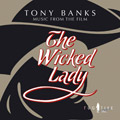

Rerelease of the original soundtrack plus some extra tracks. Due 15th April 2013.